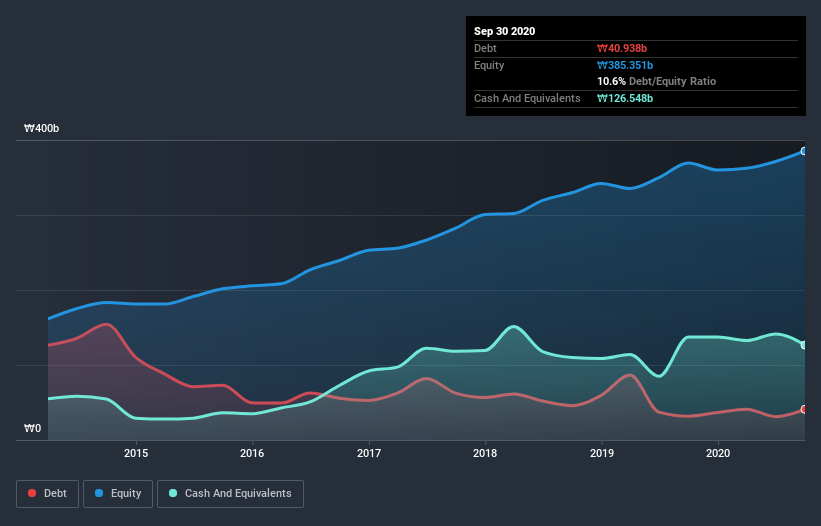- South Korea
- /
- Chemicals
- /
- KOSE:A161000
We Think Aekyung Petrochemical (KRX:161000) Can Stay On Top Of Its Debt
Some say volatility, rather than debt, is the best way to think about risk as an investor, but Warren Buffett famously said that 'Volatility is far from synonymous with risk.' So it seems the smart money knows that debt - which is usually involved in bankruptcies - is a very important factor, when you assess how risky a company is. As with many other companies Aekyung Petrochemical Co., Ltd. (KRX:161000) makes use of debt. But is this debt a concern to shareholders?
Why Does Debt Bring Risk?
Debt assists a business until the business has trouble paying it off, either with new capital or with free cash flow. Ultimately, if the company can't fulfill its legal obligations to repay debt, shareholders could walk away with nothing. However, a more common (but still painful) scenario is that it has to raise new equity capital at a low price, thus permanently diluting shareholders. Of course, debt can be an important tool in businesses, particularly capital heavy businesses. When we examine debt levels, we first consider both cash and debt levels, together.
View our latest analysis for Aekyung Petrochemical
What Is Aekyung Petrochemical's Debt?
As you can see below, at the end of September 2020, Aekyung Petrochemical had ₩40.9b of debt, up from ₩31.7b a year ago. Click the image for more detail. But it also has ₩126.5b in cash to offset that, meaning it has ₩85.6b net cash.

A Look At Aekyung Petrochemical's Liabilities
The latest balance sheet data shows that Aekyung Petrochemical had liabilities of ₩116.2b due within a year, and liabilities of ₩17.8b falling due after that. Offsetting this, it had ₩126.5b in cash and ₩82.1b in receivables that were due within 12 months. So it can boast ₩74.6b more liquid assets than total liabilities.
This excess liquidity suggests that Aekyung Petrochemical is taking a careful approach to debt. Because it has plenty of assets, it is unlikely to have trouble with its lenders. Succinctly put, Aekyung Petrochemical boasts net cash, so it's fair to say it does not have a heavy debt load!
Also good is that Aekyung Petrochemical grew its EBIT at 11% over the last year, further increasing its ability to manage debt. The balance sheet is clearly the area to focus on when you are analysing debt. But it is Aekyung Petrochemical's earnings that will influence how the balance sheet holds up in the future. So if you're keen to discover more about its earnings, it might be worth checking out this graph of its long term earnings trend.
Finally, a company can only pay off debt with cold hard cash, not accounting profits. Aekyung Petrochemical may have net cash on the balance sheet, but it is still interesting to look at how well the business converts its earnings before interest and tax (EBIT) to free cash flow, because that will influence both its need for, and its capacity to manage debt. In the last three years, Aekyung Petrochemical created free cash flow amounting to 18% of its EBIT, an uninspiring performance. That limp level of cash conversion undermines its ability to manage and pay down debt.
Summing up
While it is always sensible to investigate a company's debt, in this case Aekyung Petrochemical has ₩85.6b in net cash and a decent-looking balance sheet. And it also grew its EBIT by 11% over the last year. So we don't think Aekyung Petrochemical's use of debt is risky. The balance sheet is clearly the area to focus on when you are analysing debt. However, not all investment risk resides within the balance sheet - far from it. Take risks, for example - Aekyung Petrochemical has 2 warning signs we think you should be aware of.
Of course, if you're the type of investor who prefers buying stocks without the burden of debt, then don't hesitate to discover our exclusive list of net cash growth stocks, today.
If you decide to trade Aekyung Petrochemical, use the lowest-cost* platform that is rated #1 Overall by Barron’s, Interactive Brokers. Trade stocks, options, futures, forex, bonds and funds on 135 markets, all from a single integrated account. Promoted
New: Manage All Your Stock Portfolios in One Place
We've created the ultimate portfolio companion for stock investors, and it's free.
• Connect an unlimited number of Portfolios and see your total in one currency
• Be alerted to new Warning Signs or Risks via email or mobile
• Track the Fair Value of your stocks
This article by Simply Wall St is general in nature. It does not constitute a recommendation to buy or sell any stock, and does not take account of your objectives, or your financial situation. We aim to bring you long-term focused analysis driven by fundamental data. Note that our analysis may not factor in the latest price-sensitive company announcements or qualitative material. Simply Wall St has no position in any stocks mentioned.
*Interactive Brokers Rated Lowest Cost Broker by StockBrokers.com Annual Online Review 2020
Have feedback on this article? Concerned about the content? Get in touch with us directly. Alternatively, email editorial-team (at) simplywallst.com.
About KOSE:A161000
Low risk and slightly overvalued.
Market Insights
Community Narratives



